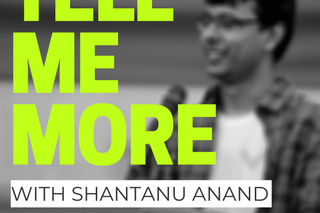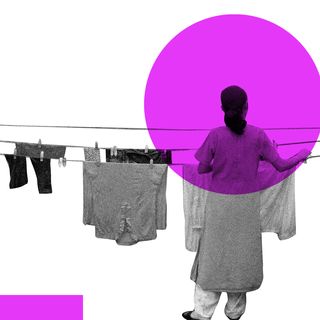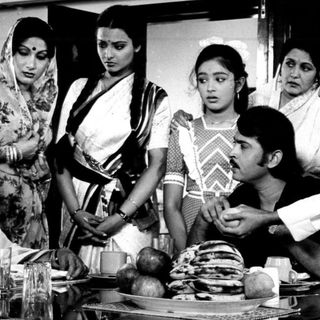
Tell Me More: Talking Poetry and Protest With Shantanu Anand, Co‑Founder of Airplane Poetry Movement
“As a poet, you have no duty to Instagram.”

In The Swaddle’s interview series Tell Me More, we discuss crucial cultural topics with people whose work pushes societal boundaries.
Shantanu Anand is a poet, storyteller, educator, and co-founder of the Airplane Poetry Movement. Shantanu spoke to The Swaddle’s Aditi Murti about the joys of performing poetry, how poetry is taught traditionally, and the importance of writing poetry for a cause.
TS: I heard this story from a poet friend about how you hosted your first few poetry slams in yogurt shops, and the prizes were cups of yogurt. How has your journey with spoken word poetry performance and education been from then to now?
SA: It’s been awesome. It’s been almost six years since we did our first batch of events. Back in the day, we did our events at a frozen yogurt shop called Cocoberry, which had a little space where 20 people could cram themselves in. It was in that little, pretty space where we could have poetry slam competitions. Sometimes, midway through the slam, the guy would start the blender and we had to actually say, “Hey, SO sorry please pause.” But they were wonderful — never asked for rent, which was great because we couldn’t afford it. And yes, we’d buy frozen yogurt for the winners!
Now, in a weird way, it’s still the same. I mean, Airplane Poetry’s biggest event had 1200 people in 2016, but it’s still just one person on the stage speaking. Whether there’s a crowd of 1000 or 10,000, that will never change. Of course, there’s a lot of other things that have changed — brands, commercial elements — but spoken word poetry is still someone speaking about what they weren’t expected to speak about. That still remains.
TS: And how has the Covid19 lock-down changed the ability to engage with a spoken word performer and the audience?
SA: Doing slam competitions online means, if you have access to Zoom, you can immediately be accessible to people across the country and the world. However, it’s still not ideal because it cuts off access to those who don’t have internet access. But — I’ve discussed this with so many poets — the core of slam is in the moment. It’s energy. The performance of a slam poem cannot be judged on video. People who haven’t been to a real poetry slam — where the organizers and the poets actually care about the event. If you’ve been to one of those, you know that no online experience can replicate some person coming up on stage — and you can see that they’re nervous, you can feel their nervous energy, and there’s this moment where you realize what this piece means to them before they even start talking. And then they start. Of course, sometimes it’s not perfect. They’ll fumble, some of the lines may not be well delivered. But, as a whole, right? That moment when they’re bearing themselves to you with no expectations, there’s a certain emotional intimacy with the audience that’s great. You can’t recreate that on Zoom, unfortunately, and I miss that.
Related on The Swaddle:
Poetry Has The Power to Move Us, So Why Is It Still Taught In Such a Boring Way?
TS: There’s a radical difference between how we read poetry, recite poetry, and perform spoken word poetry. How do you see the difference between simply reciting poetry in an elocution competition and performing it?
SA: So there’s three levels to engaging with poetry aloud — reading, reciting and performing. Simply reading poetry onstage is meaningless. If you’re going to read it deadpan, I may as well read it myself. Of course there’s an exception to this — there’s a poet named Ocean Vuong, and they’re extremely introverted so they don’t perform. They just read, but their words are so powerful, and there’s so much vulnerability on their face and voice — at times Vuong’s voice is almost shaking and you know it’s hard for them to do this. But Ocean Vuong is one of the best contemporary poets around, and experiencing their poetry is incredible. So that’s unique — where merely the act of being on stage and being vulnerable adds to the performance. But, generally I don’t have time for people who just want to read.
Reciting is very school, very formal. It’s more about pronunciation and maintaining a rhythm. I’ve seen the art of recitation in spoken word circuits — a lot of people would do this back in the day because their only exposure to spoken word poetry was elocution. That was also one of the reasons we did workshops — we wanted to break that. I don’t think elocution is bad — it’s useful for developing skills. Do I want to see it at a poetry slam? Definitely not. But I’ve seen a lot of artists take from that tradition and bring it into their original poetry performances — it’s very formal and textbook. They are absolutely perfect — zero traces of local accents, fantastic posture — no scope to give negative marks in a slam poetry competition. That, I’m personally not a fan of. I like local accents. I like it when people are so into their performance that they go a pitch or two higher than usual. Sometimes you can hear the physical effect of a person’s poem on their face and voice. And what causes these imperfections is being super tuned into what they’re performing. Of course, again, if I had to score it in a traditional sense, I’d have to cut marks. But, those imperfections are what make slam poetry extraordinary to me particularly. Some poets combine both their passion and perfection of performance, and that is just the top of the tree — that’s where I’d want to be. But, if you’re not perfect, simply being authentic trumps everything. That’s a performance for me — bringing your poem to life through your voice, your body language.
TS: A lot of young people just memorized poems and answered questions about it from an analytical perspective. Do you think people’s value for poetry would change if it were taught as performance art rather than just a literary art?
SA: Here’s how I would love to teach poetry. I’d introduce people to poems that are fun, and poems that are relatable. For sixteen-year-olds, it’d be great to introduce them to a poem with a swear-word, because it just makes things more dangerous, but real. I think to say, an eight-year-old would love a poem about staying up rather than about Daffodils. Plus, I want younger people to write as soon as possible. Write shit, but write! Because when you write, you appreciate reading so much more. And these kids should never be graded for what they write — that’ll help kids see the true power of poetry.
With respect to poetry analysis, you’re given an interpretation of the poem and that’s what you write in the exams. That’s how we were all taught. But, I’d like for people to read poetry uniquely — with different intonations, and different interpretations. Of course, we can talk about what the author intended, but all interpretations are correct and fine.
TS: We know that spoken word poetry blew up due to social media — notably Facebook and Youtube, then Instagram. What is the place of social media in a young poet’s life?
SA: So there’s this guy called Angshuman Sarma, who’s writing a thousand poems in a thousand days. I think he’s reached 128, and he’s posted daily. Now he’s doing this the right way because he’s making it very clear that every poem is not going to be perfect! But, I promise you this, if he does this for a 1000 days, he will be a better poet on the 1001’st day than he was on day one. I love this! because athletes train on a daily basis but poets don’t — poets train once in three months when inspiration comes to us and then we wonder why we’re not great. If you write as a hobby, you do it at your own pace. But, you shouldn’t expect to become great if you’re not putting in the work.
You shouldn’t be guided by what the algorithm wants you to do if you’re a poet. That is unless you want to be an influencer, in which case, follow the rules that influencers do. As a poet, you have no duty to Instagram. Use it as a tool to promote your work, but let your first focus be art.
Related on The Swaddle:
14‑Year‑Olds Running Slam Poetry Workshops Prove Arts Education Shouldn’t Be an Afterthought
TS: How did the spoken word poetry scene intertwine with activism, and how can the audience point out that difference between protest poetry written in good faith, vs poetry written to push an influencer career?
SA: There’s always been an association between spoken word poetry and activism. I remember Hanif Abdurraqib wrote a poem called “How Can Black People Write About Flowers at a Time Like This” — in relation to the Black Lives Matter movement. As a poet, if you have a voice and a platform, you feel an obligation to feel about social issues. I think that perception is there for a reason. Popular art — if you even think about Bob Dylan’s association with the Civil Rights Movement or even the Hungry Poets of 1960s Bengal — is quite intertwined with activism.
The problem is when an individual poet gets a platform before they’re ready for it. If you feel a responsibility to speak about a thing, but don’t feel qualified enough to speak about it — there’s two sides to this coin. Are you going to speak up for the right reasons or are you diluting the movement by adding a voice which is almost like a mirage. When you don’t have enough knowledge, context and maturity to speak about a thing and you’re the mouthpiece for an entire movement — you affect both the movement and the people working for it. That’s why you have to be responsible with your mic.
So, in India. Aamir Aziz did a poem called “Sab Yaad Rakha Jayega” and Roger Waters from Pink Floyd read out a transcript of it. That’s such a lovely example of this. In the Shaheen Bagh protests, you saw poets performing because they were adding to the atmosphere and showing support via their poetry. The poetry became a pillar for people to gather around and lean on, if people needed it. At that point, art becomes a support structure, and that’s what art does — it gives you strength, it has the ability to inspire thousands of people at once. Few other things can do this — and in those moments of revolution, when you really need strength, that is exactly when you realize the true beauty of protest poetry.
There’s obviously the other side, where people attempt to dilute the movement by performing for personal gain. But you know what I’ve realized? It doesn’t matter! Nobody remembers these individualist poems! I think a lot of people make a massive deal about them killing the movement. Like, feminism is not going to die if someone writes one shitty feminist poem. And we shouldn’t use that as a reason to put down people who are telling their truth.
TS: Once upon a time, feminism was a heavily prominent theme in spoken word poetry. What social issues are young poets passionate about these days and what would you like to see more of?
SA: I hope that caste inequalities come up more often. There are enough poets speaking about it, but they don’t get a microphone of the same size that other people do. I really like Daniel Sukumar, because he talks about the migrant crisis and social inequalities. Plus, there’s religion, which I think is massive, considering how we live in a place where political forces have an incentive to divide us. I definitely predict and hope to see way more of caste, religious solidarity, and economic inequality addressed in poetry.
TS: As spoken word poetry became a big deal in India, it also attracted enormous amounts of backlash. What do you think caused this negative reaction?
SA: Everything gets backlash, simply because you can’t please everyone. You cook a dish — you may like it but someone else is going to say it’s too salty. That’s just the unfortunate truth. So, let the backlash come, but keep creating. However, if you’re getting one specific type of criticism repeatedly, you do have a responsibility to investigate, no matter how cool it sounds to say ‘Ignore criticism.’
TS: How can an inexperienced poet start learning how to write and navigate the unique facets of spoken word poetry?
SA: This is a bit hard to answer now considering the lockdown situation. Earlier, I’d just say go to as many spoken word poetry events as you like and simply listen. People don’t want to do that, because they want to be up on stage. Now that option is not ideal, but the core principle is the same — if you’re a young artist trying to make it, simply listen to great art. If you merely watch three videos and say, okay, now I’m writing a poem — that poem’s not going to be very good. There are virtual events happening so listen to perspectives from various different spaces — accounts on Instagram are educating you for free! There’s no clear playbook here — listen and write responsibly, and after that, your time will come. Till then, just focus on your art.
Aditi Murti is a culture writer at The Swaddle. Previously, she worked as a freelance journalist focused on gender and cities. Find her on social media @aditimurti.
Related


Only 26% of Indian Men Do Any Kind of Housework, Finds National Survey
